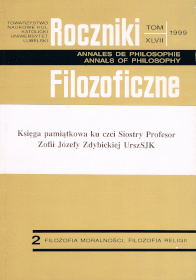Problem realizmu w etyce Antonio Rosminiego
Abstrakt
Antonio Rosmini undertakes the problem of realism in ethics in connection with the crisis caused on the one hand by empiricism and utilitarianism which results from it, and on the other hand by aprioristic rationalism leading to subjectivism and relativism. The author of the article revises the view that Rosmini’s ethics is a version of I. Kant’s ethics. Such an opinion does not sufficiently take into consideration Rosmini complex relation to Kantian attempt at justification of moral duty. Rosmini's work „I principi della scienza morale” is not a polemics with Kant’s philosophy of morality, as criticism of Kant’s views is undertaken in the context of positive research on the essence of morality and its ontological foundations, hence Rosmini also positively appraises Kant's intuitions. He shows that both empiricism and rationalism do not construct ethical theories on the basis of complete data of an experiment (osservazione imparziale ed intera). This leads to empirical ethics claiming that the contents of moral duty have the features of the subject of morality: accidentality and changeability, whereas rationalism transfers the features of moral law to the subject and makes it an absolute being. After Kant Rosmini accepts methodological separation of ethics from eudaemonology because of their two different formal objects. Ethics deals with objective good, and eudeaemonology with subjective good related to the needs of the subject. This allows overcoming the naturalist mistake in ethics. However, he explains the categorical character of the moral imperative in a way different from Kant’s. The rules of morality are not facts of the reason but they may be realistically found out as the laws of reality. Being and the truth are notions on the basis of which both realistic metaphysics and realistic ethics are built.
Copyright (c) 1999 Roczniki Filozoficzne

Utwór dostępny jest na licencji Creative Commons Uznanie autorstwa – Użycie niekomercyjne – Bez utworów zależnych 4.0 Międzynarodowe.





